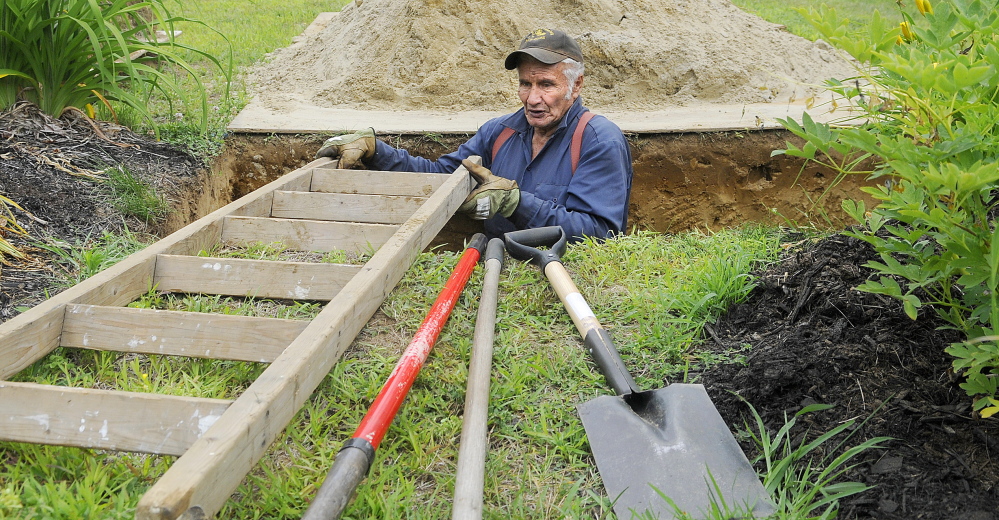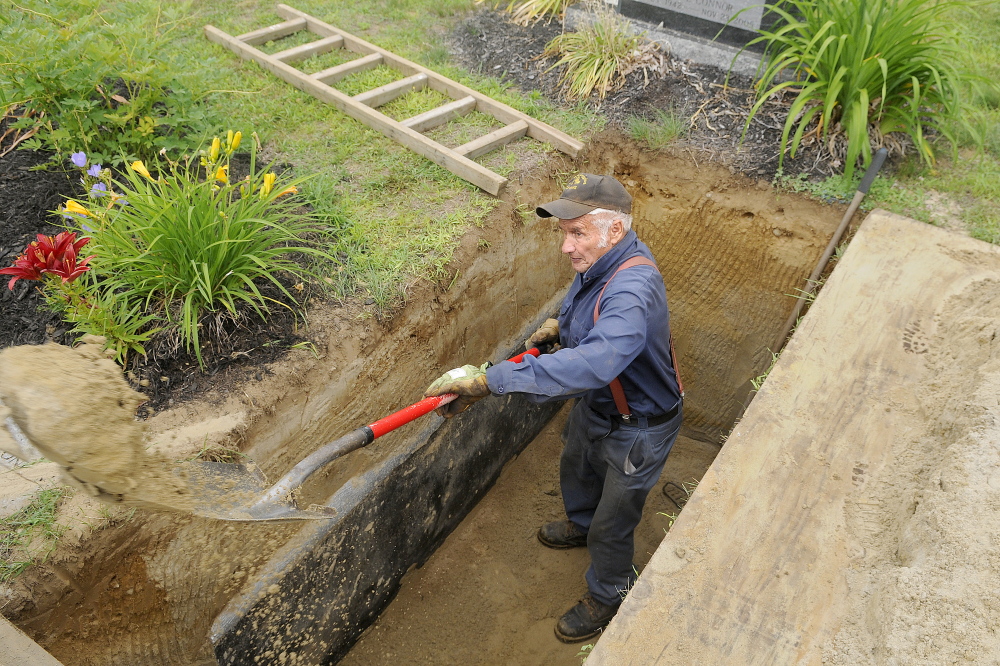LITCHFIELD — Donald Vannah crouched on one knee in front of his gravestone and wiped off dirt with the back of his gloved hand. To the right of his flat granite marker, where he’ll eventually be buried, is his wife’s gravestone.
Louise Danforth Vannah, who died in 2005 at the age of 72, was an avid camper, so her gravestone reads “Happy Camper.” Above the marker is a small, manicured mound with a white cross covered by a lei from a son who recently visited Hawaii and a wooden Tweety Bird lawn ornament, its yellow wings spinning with the wind.
Vannah, 82, didn’t dig his wife’s grave — their three sons wouldn’t let him — but as head groundskeeper and gravedigger, he’s dug hundreds of other graves over the last 16 years at the Litchfield Plains Cemetery.
“I’ve seen one woman crying her eyes out, hugging the ground, hugging the coffin,” Vannah said. “It’s a hard thing to do, to cut them out. You’ve got to be patient. Patience is a virtue. You don’t die every day.”
Vannah was born in Litchfield a few miles from the cemetery, but he spent most of his adolescent and adult life, since the age 14 or 15, logging in the Allagash. His gravestone proudly declares his former occupation: “Donald Vannah. Allagash Logger.”
After retiring and returning to live in Litchfield full time, Vannah was asked by David Larrabbee, the cemetery sexton, if he wanted to be the groundskeeper and gravedigger. Since then, he’s been caring for the roughly 20 acres at the cemetery and the graves of an estimated 3,500 people.
Vannah works Monday through Friday, as well as Saturday and Sunday burials.
Vannah digs the graves with a shovel, his slight, frame heaving dirt out of the 8-foot-long, 40-inch-wide and 56-inch-deep holes.
George Rogers, president of the association that owns the cemetery, said most cemeteries use backhoes to dig the graves, but the sandy ground at Litchfield Plains Cemetery allows the association to use a manual gravedigger. The association wouldn’t be able to buy the needed equipment or hire a contractor for every burial to do it with equipment, Rogers said.
“I wouldn’t be at all surprised that when Donald goes, it will be almost impossible to find anyone willing to dig a hole all by hand. That’s the problem,” Rogers said.
Vannah said it takes him four to five hours to dig a hole for a coffin, and after the coffin is lowered into the grave, he has to fill it back in.
The most unusual ceremonies are burials of people in motorcycle groups, Vannah said. He said he’s seen them urinate on the gravesites, pour beer over the graves and even shoot at the ground with a pistol.
“It’s weird,” Vannah said. “Everybody’s different, the way they do things.”
When asked what he thinks of the different burial customs or burying his relatives or mowing around his own and his wife’s gravestones, his response is the same: “It don’t bother me.”
Litchfield Plains Cemetery, like cemeteries all over the country, has had a decline in revenue from the increase in cremations and decline in traditional burials, said Rogers, the association president. The cemetery relies on that revenue to pay for the care of a growing number of gravesites.
“It’s tough times for cemeteries, because you have perpetual care,” Rogers said. “Someone paid 50 cents in 1860, and you’re taking care of it forever. It’s a hard time for cemeteries everywhere.”
The national rate of cremations, which cost less than traditional burials, has increased dramatically since it was around 3.5 percent in 1960, according to the National Funeral Directors Association. This year, the association predicts, the number of cremations will surpass the number of burials in the country. By 2030, the cremation rate is expected to be around 70 percent.
In Maine, the cremation rate already is expected to surpass 70 percent this year. By 2030, the cremation rate in Maine will be more than 84 percent, the funeral directors association predicts.
Vannah said he hopes to dig graves in his hometown for another decade. So far this year, he’s dug six graves, but he said he never knows how many he’ll end up digging each year.
“They can die anytime,” he said
Paul Koenig — 621-5663
Twitter: @pdkoenig
Send questions/comments to the editors.



